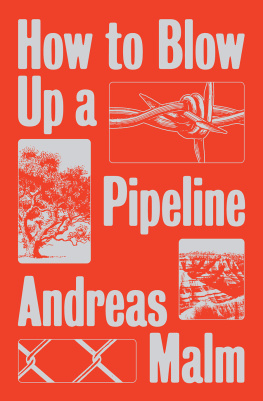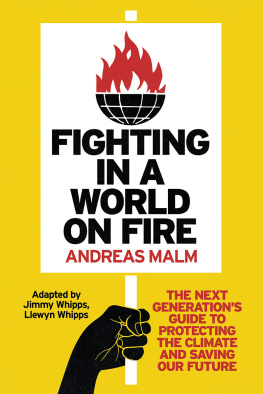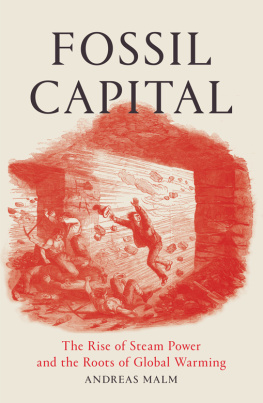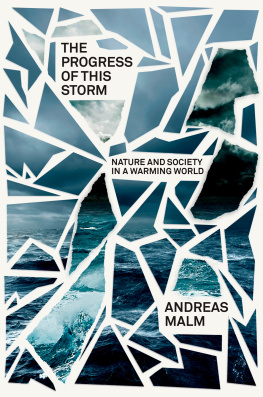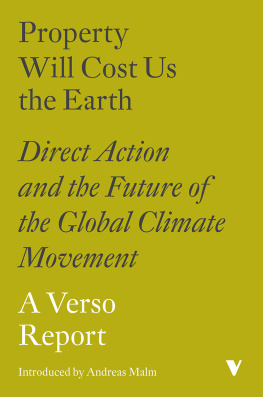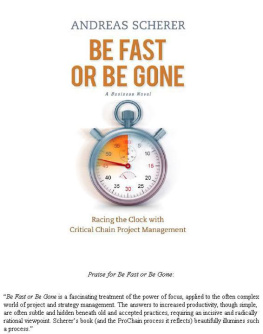Andreas Malm - How to Blow Up a Pipeline
Here you can read online Andreas Malm - How to Blow Up a Pipeline full text of the book (entire story) in english for free. Download pdf and epub, get meaning, cover and reviews about this ebook. publisher: Verso Books, genre: Art. Description of the work, (preface) as well as reviews are available. Best literature library LitArk.com created for fans of good reading and offers a wide selection of genres:
Romance novel
Science fiction
Adventure
Detective
Science
History
Home and family
Prose
Art
Politics
Computer
Non-fiction
Religion
Business
Children
Humor
Choose a favorite category and find really read worthwhile books. Enjoy immersion in the world of imagination, feel the emotions of the characters or learn something new for yourself, make an fascinating discovery.
- Book:How to Blow Up a Pipeline
- Author:
- Publisher:Verso Books
- Genre:
- Rating:3 / 5
- Favourites:Add to favourites
- Your mark:
- 60
- 1
- 2
- 3
- 4
- 5
How to Blow Up a Pipeline: summary, description and annotation
We offer to read an annotation, description, summary or preface (depends on what the author of the book "How to Blow Up a Pipeline" wrote himself). If you haven't found the necessary information about the book — write in the comments, we will try to find it.
How to Blow Up a Pipeline — read online for free the complete book (whole text) full work
Below is the text of the book, divided by pages. System saving the place of the last page read, allows you to conveniently read the book "How to Blow Up a Pipeline" online for free, without having to search again every time where you left off. Put a bookmark, and you can go to the page where you finished reading at any time.
Font size:
Interval:
Bookmark:

HOW TO BLOW UP A PIPELINE
HOW TO BLOW
UP A PIPELINE
Learning to Fight in a World on Fire
Andreas Malm

First published by Verso 2021
Andreas Malm 2021
All rights reserved
The moral rights of the author have been asserted
1 3 5 7 9 10 8 6 4 2
Verso
UK: 6 Meard Street, London W1F 0EG
US: 20 Jay Street, Suite 1010, Brooklyn, NY 11201
versobooks.com
Verso is the imprint of New Left Books
ISBN-13: 978-1-83976-025-9
ISBN-13: 978-1-83976-027-3 (UK EBK)
ISBN-13: 978-1-83976-026-6 (US EBK)
British Library Cataloguing in Publication Data
A catalogue record for this book is available from the British Library
Library of Congress Cataloging-in-Publication Data
A catalog record for this book is available from the Library of Congress
Library of Congress Control Number: 2020936555
Typeset in Adobe Garamond by Hewer Text UK Ltd, Edinburgh
Printed and bound by CPI Group (UK) Ltd, Croydon CR0 4YY
Contents
No More Excuses for Passivity
The manuscript for this book was completed before the coronavirus known as COVID-19 struck. As I write these words, the pandemic is killing some 2,000 individuals worldwide per day. It also has political victims, one of the first being the climate movement, whose high-flying popular mobilisations were punctured in an instant by the outbreak. The climate strikes that swept the globe in 2019 have been put on hold. Just before most of Europe went into complete lockdown, I met comrades in Amsterdam who had spent the past year preparing for one of the most exciting mass actions yet, called Shell Must Fall: a militant disruption of the annual shareholders meeting of Shell, advertised by the activists as the last meeting of the kind. Despondently, they realised that the action would not go ahead. In Berlin, where I write these words, the coalition at the centre of the movement, Ende Gelnde, which had similarly grand plans for 2020, has had to call off its assemblies; the two-week-long camp in the centre of the city planned by Extinction Rebellion has been cancelled. Before COVID-19, the climate movement was soaring to ever-greater heights of mass participation, but the fuel of every social movement has suddenly become so insalubrious as to be outlawed: crowds. One could be forgiven for feeling that the fate of the planet is in the hands of some malevolent celestial force.
But world capitalism has also had to close its shops like never before. Therein lies an opportunity. Emissions will plunge again, just like after the financial crisis of 2008, for reasons entirely unrelated to climate policy which in itself is a good thing. Taboos against interfering with private property have been broken. If a pandemic can induce governments to take emergency actions, why cant a climate breakdown that threatens to kill off the very life-support systems of the planet do the same? After this, there can be no more excuses for passivity.
This is not to say that aggressive climate measures will happen automatically, that the curfews and closed industries and paused airports will necessarily extend into a transition away from fossil fuels. We should rather expect the opposite: business-as-usual bouncing back as soon as the pandemic dies down. The car companies will itch to restart production, the airlines to fly again, the oil and gas companies to profit from prices rising anew. If the corona crisis constitutes an opportunity for climate mitigation, it can be realised only if acted upon.
And so the climate movement might be hibernating in quarantine for the moment, just like everybody else, but as soon as this particular emergency regime is relaxed, it must spring forth with all the vigour it can muster. Whether time has been lost or gained on balance, the struggle against climate catastrophe will be as urgent as ever. A pandemic may course through the world for a couple of years. It could peter out. It might be combatted with a vaccine. But global heating will only become progressively worse until the moment greenhouse gas emissions cease and drawdown of CO2 from the atmosphere commences. Nothing indicates that this will happen by itself that fossil capital will die a natural death which means that the climate movement will be in even greater historical demand one or two or five years from now. The tactical choices this book ponders will then reappear.
I should like to believe that the arguments put forth here have a decent chance of surviving this pandemic, insofar as the movement rebounds. The need for militancy is unlikely to be diminished. It is thus my hope that the discussion in the following pages will be of some value for the movement in its post-corona phase or even in a phase contemporaneous with COVID-19 or some other future pandemic. Sabotage, after all, is not incompatible with social distancing.
Berlin, late March 2020
On the last day of the negotiations, we geared up for our most daring action yet. We had been camping out in a shabby gymnasium in the eastern part of the city for a week. My friends and I had arrived there on a decrepit bus on the road, in the middle of the night, the exhaust pipe fell off but when we spread out on the yard of the sports centre we felt the rush of entering an alternative world: a place where business-as-usual had been suspended. A communal kitchen served vegan food. Assemblies were open to anyone with something to say. During one workshop, a man from Bangladesh outlined the devastating consequences of rising sea levels for his country; at another, delegates from small island states came to voice their distress as well as their support. My friends and I secured an audience with our environmental minister and urged her to ratchet up ambitions. The science, after all, had been clear for a long time by now.
One day we poured out of subway stations and onto a busy junction in the middle of the city and blocked the traffic with banners calling for emissions to be slashed. Activists played guitars and violins while others danced; some juggled; some handed out sunflower seeds to irate motorists. We had no intention of confronting the police or anyone else; wed rather get arrested than throw a bottle or stone. The next day, we flooded a thoroughfare with an elaborate street theatre. Dressed up as trees, flowers and animals, we laid down on the tarmac to be run over by a vehicle built of cardboard and wood to symbolise business-as-usual. Striding through the flattened crowd, protesters in UN delegate costumes carried signs saying Blah-Blah-Blah and did nothing.
And now it was the final day of the negotiations. Hired buses drove all 500 of us close to the venue. On signal, we marched to the building and tried to prevent the delegates from leaving by locking ourselves to the gates with chains and lying down on the ground, all the while chanting: No more blah-blah-blah Action now! No more blah-blah-blah Action now!
This happened in 1995. The scene was COP1, the very first in the annual series of UN climate summits, in Berlin. The delegates snuck out through a backdoor. Since then, total annual CO2 emissions in the world have grown by some 60 per cent. In the year of that summit, the combustion of fossil fuels pumped more than six gigatons of carbon into the atmosphere; in 2018, the figure passed ten. In the twenty-five years after the delegates left, more carbon was released from underground stocks than in the seventy-five years before they met.
Next pageFont size:
Interval:
Bookmark:
Similar books «How to Blow Up a Pipeline»
Look at similar books to How to Blow Up a Pipeline. We have selected literature similar in name and meaning in the hope of providing readers with more options to find new, interesting, not yet read works.
Discussion, reviews of the book How to Blow Up a Pipeline and just readers' own opinions. Leave your comments, write what you think about the work, its meaning or the main characters. Specify what exactly you liked and what you didn't like, and why you think so.

